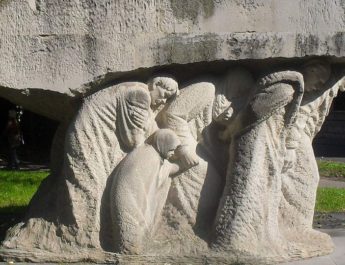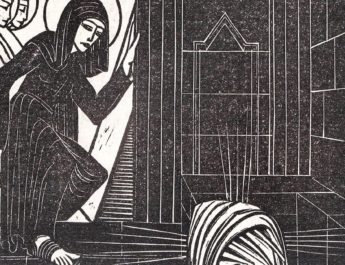Psalm 85:1-2, 8-13
Second Sunday of Advent B
To the leader.A Of the Korahites.B A Psalm.C
A “leader” = natsach. Properly, something that glitters from a distance. So, something that stands out, excels, has status/standing (such as a chief musician or superintendent of Temple services). This can also mean to be permanent or enduring.
B “Korahites” = ben + Qorach. Literally, “children of Korah.” Ben is from banah (to build or obtain children). This is son, age, child. It is son in a literal or figurative sense. Qorach is from qarach (to shave bald, perhaps frozen). This is Korah, perhaps meaning “ice,” “frost,” “hail,” or “baldness.” See https://www.abarim-publications.com/Meaning/Korah.html
C “Psalm” = mizmor. From zamar (making music; used specially of music to worship God; music with singing, singing praise, singing psalms); may be from zamar (to trim or prune). This is a melody or a psalm.
1 Lord,D you were favorableE to your land;F
D “Lord” = YHVH. From havah (to be, become) or hayah (to come to pass, become, be). This is the name of the God of Israel, the self-existent and eternal one, the tetragrammaton. This pronunciation has been lost to time so “Lord” is generally used in its place.
E “were favorable” = ratsah. This is to be pleased with, delight, take pleasure in, or accept with favor. It can mean to approve or consent regarding something. It can also be used specifically of satisfying debts or being pardoned.
F “land” = erets. Root may mean to be firm. This is earth, ground, field land, or country.
you restoredG the fortunesH of Jacob.I
G “restored” = shub. To turn back, return, turn away – literally or figuratively. Doesn’t necessarily imply going back to where you started from. This is also the root verb for the Hebrew word for repentance “teshubah.”
H “fortunes” = shebuth. From shabah (to take captive, keep, a captor). This is prisoners or exile. It can also be used figuratively to describe a previous condition of prosperity.
I “Jacob” = Yaaqob. From the same as aqeb (heel, hind part, hoof, rear guard of an army, one who lies in wait, usurper). This is Isaac’s son and his descendants. The name means heel-catcher or supplanter.
2 You forgaveJ the iniquityK of your people;L
J “forgave” = nasa. This is to lift in a broad sense, literally and figuratively. So it could be to carry, take, or arise. It could also be bring forth, advance, accept.
K “iniquity” = avon. Perhaps related to avah (to bend, twist, be amiss). This is sin, mischief, guilt, fault, punishment for iniquity, or moral evil.
L “people” = am. From amam (to darken, hide, associate; creating shadows by huddling together). This is people or nation. It can be used specifically for a tribe, collectively of troops or armies, or figuratively to refer to a flock of animals.
you pardonedM allN their sin.O SelahP
M “pardoned” = kasah. This is to cover, conceal, overwhelm. It is to cover as clothes do or to hide a secret.
N “all” = kol. From kalal (to complete). This is all or every.
O “sin” = chatta’ah. From chata’ (to miss or go wrong and so to sin, bear the blame; it can also include the sense of forfeiting or lacking). This is sin itself as well as punishment for sin. It is sometimes used specifically to refer to sin that is habitual.
P “Selah” = selah. From salal (to lift up, build, pile, extol, exalt; can also be used for opposing as a dam holds back water). This is to lift up or exalt. Also, “selah” in the psalms where its precise meaning is uncertain. It could be a pause in the music, a moment of silence. It could signal a change in the service or mean something akin to amen.
8 Let me hearQ what GodR the Lord will speak,S
for he will speak peaceT to his people,
Q “hear” = shama. This is to hear, call, consent, or consider. It implies listening intelligently, giving attention, and, because of these two factors, obedience and action are often implied.
R “God” = El.
S “speak” = dabar. This is generally to speak, answer, declare, or command. It might mean to arrange and so to speak in a figurative sense as arranging words.
T “peace” = shalom. From shalam (to be complete or sound; to have safety mentally, physically, or extending to one’s estate; so, if these things are safe and complete, the implication is that one would be friendly; and, if being friendly, one would make amends and that friendship would be reciprocated). This is completeness, soundness, welfare, favor, friend, good health. It is to be safe and figuratively well, happy, at peace, friendly. Abstractly, it includes the ideas of welfare and prosperity (not in excessive wealth, but in having enough).
to his faithful,U to those who turnV to him in their hearts.W
U “faithful” = chasid. From chasad (being good, kind, merciful; may mean bowing one’s neck as is done in the presence of an equal for courtesy’s sake; so, if one in a superior position is treating you like an equal, that is what is captured here). This is faithful, kind, pious, merciful, or gracious. It can also refer to godly or pious people. This is where Chasidic Jews take their name from.
V “turn” = shub. Same as “restored” in v1. See note G above.
W “hearts” = kislah. 2x in OT. From kesel (loins, thigh, flank, fatness; folly, silliness, confidence, or hope); from kasal (being or becoming stupid or foolish; properly, being fat and so figuratively silly or foolish). This is folly or silliness. In a positive sense, it could be confidence or trust.
9 SurelyX his salvationY is at handZ for those who fearAA him,
that his gloryBB may dwellCC in our land.
X “surely” = ak. Related to aken (surely, truly, nevertheless); from kun (properly, in a perpendicular position; literally, to establish, fix, fasten, prepare; figuratively, it is certainty, to be firm, faithfulness, render sure or prosperous). This is a positive statement – surely, also, certainly, alone, only.
Y “salvation” = yesha. From yasha (to deliver, defend, help, preserve, rescue, be safe. Properly, to be open, wide or free, which implies being safe. Used causatively, it means to free). This is salvation, deliverance, rescue, safety, welfare, liberty.
Z “at hand” = qarob. From qarab (to come near, offer, make ready). This is near whether nearby, related, near in time, or allied.
AA “fear” = yare. From the same as yare (to fear, be afraid, dreadful; also fearful reverence – to fear in a moral sense is to say to revere, respect). This is fearful or morally reverent.
BB “glory” = kabod. From kabad (to be heavy, weighty, burdensome). This is weighty. Figuratively, glorious, abundant, riches, honor, splendor – a reference to one’s reputation or character. This word is often used to describe God and God’s presence.
CC “dwell” = shakan. This is to settle down in the sense of residing somewhere or staying there permanently. It can mean abide or continue. “Mishkan,” taken from this verb, is the Hebrew word for the Tabernacle (as a place where God abided).
10 Steadfast loveDD and faithfulnessEE will meet;FF
righteousnessGG and peace will kissHH each other.
DD “steadfast love” = chesed. Related to “faithful” in v8. From chasad (see note U above). This is favor, goodness, kindness, loving kindness, pity, reproach, or a good deed. When done by God to humanity, this is mercy/loving kindness. When done by humanity to God, it is piety.
EE “faithfulness” = emet. From aman (to believe, endure, fulfill, confirm, support, be faithful, put one’s trust in, be steadfast. Figuratively, this is to be firm, steadfast, or faithful, trusting, believing, being permanent, morally solid). This is firmness or stability. Figuratively, it is faithfulness, truth, or trustworthiness. This is the same root that “amen” comes from.
FF “meet” = pagash. 14x in OT. This is to meet. It could be an incidental meeting or a violence encounter. It can also mean to have something in common or to agree.
GG “righteousness” = tsedeq. This is rightness, righteousness, vindication. It is everything that is just or ethical. That which is right in a natural, moral, or legal sense. It also includes just weights (i.e. true weights). Figuratively, this is justice, righteousness, equity – even prosperity.
HH “kiss” = nashaq. This is to kiss in a literal or figurative sense. It can mean to touch, rule, or equip with weapons.
11 FaithfulnessII will spring upJJ from the ground,KK
and righteousness will look downLL from the sky.MM
II “faithfulness” = emet. Same as “faithfulness” in v10. See note EE above.
JJ “spring up” = tsamach. This is to sprout, grow, or spring up – literal or figurative.
KK “ground” = erets. Same as “land” in v1. See note F above.
LL “look down” = shaqaph. This is to look down or look out. Properly, it is looking by leaning out a window. It can be peeping or gazing.
MM “sky” = shamayim. Root may mean being lofty. This is sky, the air, or heaven. It is in a dual noun form so this might refer to the part of the sky where the clouds move on the one hand and the part beyond that where the sun, moon, and stars are on the other hand.
12 NNThe Lord will giveOO what is good,PP
and our land will yieldQQ its increase.RR
NN {untranslated} = gam. This is also, moreover, again.
OO “give” = natan. This is to give, put, set, offer. It is to give literally or figuratively.
PP “good” = tob. From tob (to be pleasing, to be good). This is good, beautiful, pleasant, agreeable, bountiful, at ease. This word is used for goodness as a concept, a good thing, a good person. This can refer to prosperity and welfare as well as joy, kindness, sweetness, and graciousness. So, this is ethically good, but also enjoyably good.
QQ “yield” = natan. Same as “give” in v12. See note OO above.
RR “increase” = yebul. 13x in OT. From yabal (to lead, bring, carry, conduct; properly, to flow; to bring or lead with fanfare). This is yield, produce. Literally, it refers to crops and figuratively to wealth.
13 Righteousness will goSS beforeTT him
and will makeUU a pathVV for his steps.WW
SS “go” = halak. This is go, come, walk. It is walk literally and figuratively and includes people and animals. It can be used figuratively for one’s moral life – how we walk according to God’s way or against it. It can also refer to the walk of life as in the course one’s life takes, the choices we make, etc.
TT “before” = paneh. From panah (to turn, face, appear). This is face in a literal or figurative sense. It could be face, presence, anger, respect. It can also be used of God to indicate divine favor or presence.
UU “make” = sim. This is to put or place in a literal or figurative sense. It can be appoint, care, change, make, and may other things.
VV “path” = derek. From darak (to tread, march, to walk. Can also mean affixing a string to a box since one needs to step on it to bend it in the process; so also an archer). This is a road as a thing that is walked on. Can be used figuratively for the path that one’s life takes or how one chooses to live one’s life.
WW “steps” = paam. From paam (to move, trouble; to tap in a regular rhythm; to agitate). This is a beat, stroke, footstep, or occurrence.
Image credit: “God has Promised – Abstract Row of Palmtrees Sunset in Esco 2019 – Enlight265 Art4TheGlryOfGod rsz” by Sharon Tate Soberon, 2019.




